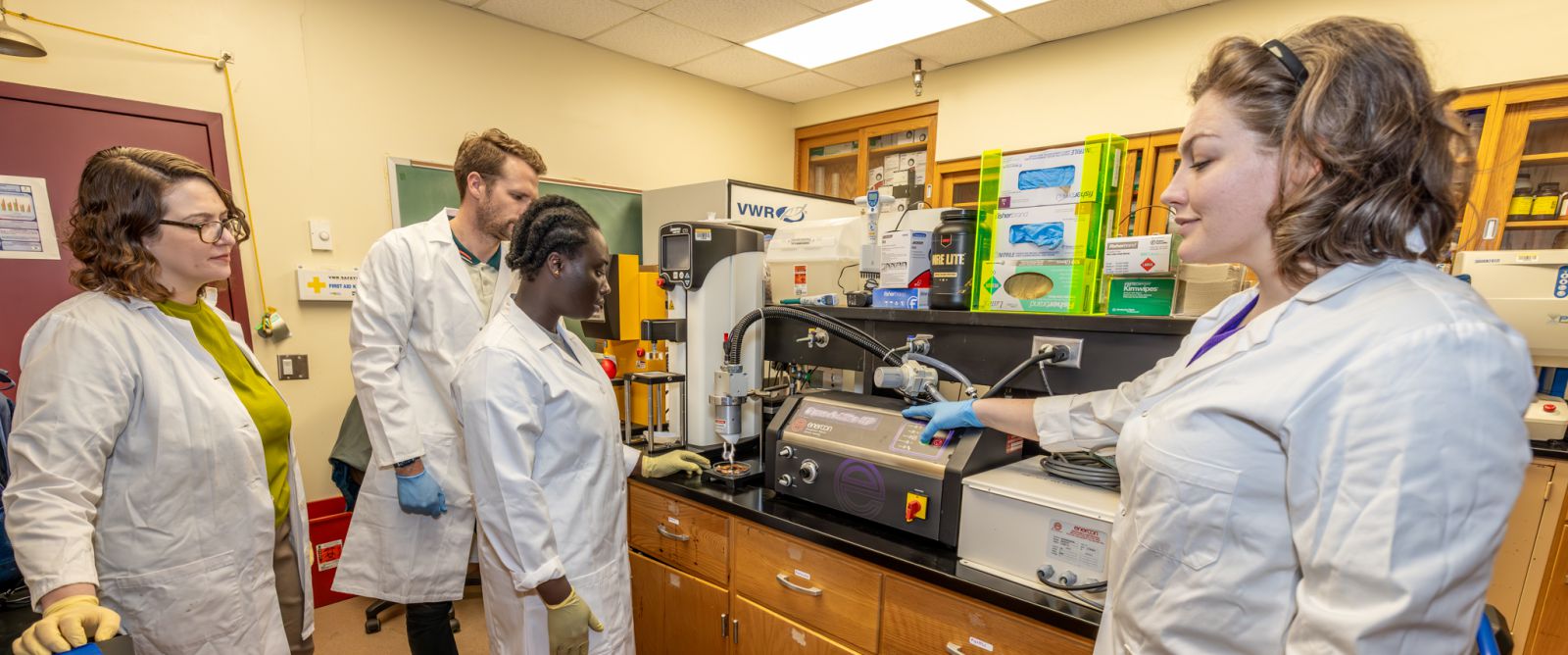News and Press
Pecan safety: Harnessing novel technologies to reduce contamination
Posted on Aug 15, 2025 at 16:17 PM

Graduate Vera Arthur and researchers from the Southeastern Fruit and Tree Nut Research Station of the U.S. Department of Agriculture’s Agricultural Research Service work in the lab on Fort Valley State University’s campus.
Tree nuts like Georgia’s pecans are economically important food products worldwide.
According to a 2024 report by the U.S. Department of Agriculture’s (USDA) Economic Research Service, the global tree nut market has grown exponentially in the last 20 years. The United States exported more tree nuts than any other major producers, with almonds taking the lead.
Researchers at Fort Valley State University are contributing to sustaining this thriving industry for the safety of consumers.
Ajit Mahapatra, Ph.D., professor of food engineering, and Rabin Gyawali, Ph.D., food scientist, use nonthermal technologies like intense pulsed UV light and essential oils in the FVSU Food Engineering Laboratory. They are studying the effectiveness of pulsed UV light in killing E. coli on pecans, aided by research assistant Hema Degala.
The FVSU duo reports an increase in foodborne illnesses associated with low-moisture foods has led to growing concerns regarding the safety of nuts and nut-based products. Nonthermal techniques, antimicrobial agents and different packaging solutions provide an alternative to thermal processing that can achieve microbial safety and preserve the quality of nuts.
“The popularity of nuts as heart-healthy snack foods is growing,” Mahapatra said. “It is important that they are handled safely and free from harmful microorganisms before consumption.”
However, originally considered microbiologically safe, nuts and nut-based products have been consistently contaminated with foodborne pathogens. As a result, food safety is becoming a serious concern in the nut processing industry. Salmonella is the primary pathogen of concern.
The FVSU scientists found that with pulsed UV light, they reduced the decontamination of pecans to 99.9% within 40 seconds.
.jpg)
Researchers Ajit Mahapatra, Ph.D., Rabin Gyawali, Ph.D., and Hema Degala use intense pulsed UV light to decontaminate pecans in the FVSU Food Engineering Laboratory.
“Nonthermal processing technologies can be used to enhance the safety and quality of nuts while keeping the loss of product quality to a minimum,” Mahapatra explained.
He said with the increasing demand for nonthermal processing, energy-based technology will be a promising way to reduce microbial load without leaving toxic chemical residue.
“Pulsed UV light is a highly intense pulse and kills bacteria within seconds. Also, it doesn't need water and doesn't leave any residue. So, it’s environmentally safe,” Gyawali added. “The installation cost for producers may be high, but it will ultimately save them money and make food safer and cheaper for consumers.”
To further this research, Mahapatra and Gyawali collaborated with Cameron Bardsley, Ph.D., research food technologist; Kaicie Chasteen-Ko, food technologist; and Samantha Sherman, plant physiologist and FVSU alumna. The three partners are with the Southeastern Fruit and Tree Nut Research Station of the U.S. Department of Agriculture’s (USDA) Agricultural Research Service (ARS) in Byron, Georgia.
Bardsley said their research focuses on identifying potential alternatives for food safety and pecan shelling facilities.
“We want to make sure that we find alternative processes that also maintain quality so that it’s not going to impact spoilage, color or shelf-life,” Bardsley said.
The USDA ARS Byron Food Safety Lab works with cold plasma, which is a low-cost and efficient nonthermal method, Bardsley noted.
“I think it’s important to explore novel technologies,” Chasteen-Ko said. “The producers care about what can make their products reasonably safe but also want to be able to run their businesses.”
Sherman, who earned her Master of Science in biotechnology at FVSU in 2021 and worked as a research assistant, said FVSU prepared her to take on new challenges and be open to exploring new technologies.
“I’ve been very grateful to see what other research is out there being done,” Sherman said. “I hope I can help farmers make more money, which in the end also makes the food that we eat more affordable.”
In addition to Sherman, Vera Arthur, who also earned her Master of Science in biotechnology at FVSU in 2024, gained experience working at the USDA ARS Byron Research Station. She conducted research on pecan safety under the supervision of Mahapatra. She will pursue a doctorate in food science at the University of Arkansas in the spring of 2025.
Bardsley commended Arthur’s work and emphasized the importance of connections.
“She helped progress our research, as well as the research here at Fort Valley,” Bardsley said.
This $432,000 research project, “Enhancing Food Safety in Pecan Processing,” is supported by the USDA’s Research Education and Economics (No. 440662). Recent studies on pecan safety have been published in food science journals by Elsevier.
- Categories:
- FVSU Agriculture College
- Tags:
- Research
Media Contact
- Latasha Ford
- fordl@fvsu.edu